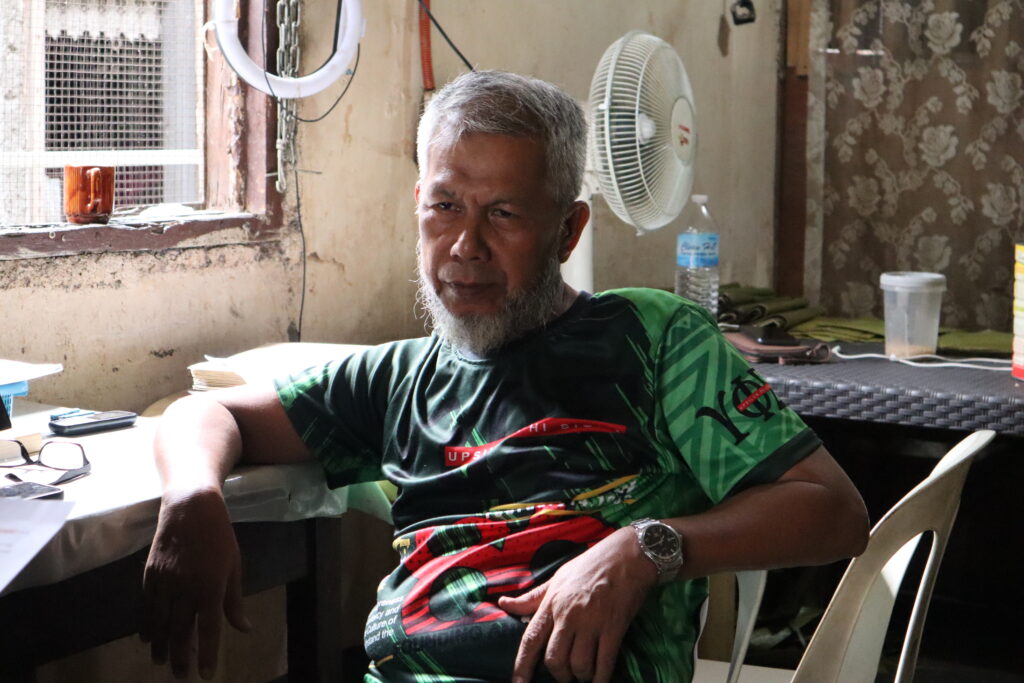“It is difficult and daunting if you did not have your legal identity back then.”
In the town of Kitango, Datu Saudi Ampatuan, Zuharto Makakua lives with his wife and four children — two of which have already graduated. They own a small restaurant and a shop in the market as their primary source of livelihood.
Zuharto is a decommissioned combatant and is currently assigned as the focal person of the 108th Base Command. Although his family and community have lived well amid the decommissioning process, they are yet to receive the financial assistance promised to them by the government, supplementary to the P100,000 initially provided to them.
The socioeconomic aid for decommissioned combatants was made possible by the ratification of the Comprehensive Agreement on Bangsamoro (CAB), signed by the Philippine Government and the Moro Islamic Liberation Front. Under the agreement’s normalization track, peace is pursued by addressing the root causes of conflict through disarmament, socio-economic development, and reconciliation.
While the government has linked decommissioned combatants to basic social services and provided P100,000 cash assistance, for Zuharto and others, true peace and inclusivity remain a challenge to overcome. Zuharto continues to struggle to apply for government programs and benefits as he did not have any valid documents to present, such as a birth certificate.
In the Bangsamoro Autonomous Region in Muslim Mindanao (BARMM), birth registration rates continue to stagger. 2020 data from the Philippine Statistics Authority (PSA) unveiled the region’s birth registration rate at 77%, the lowest among regions in the country. Additionally, 2022 PSA data surfaced that BARMM had the highest proportion of late registered births at 26.8%.
Under years of conflict, Filipinos residing in the BARMM grapple with the lack of access to birth registration services, let alone the right to their own identity. They were forced to live under aliases to remain in anonymity under combat. As part of the peace process, decommissioned combatants initially detach from their nom-de-guerres and are provided the first steps towards pursuing and acquiring their legal identity onwards their reintegration to society.
As soon as Zuharto heard of the civil registration program of IDEALS, he immediately came to apply for assistance. For him, it is important to register his identity to be fully recognized as a citizen; reclaiming his identity as part of the Bangsamoro people. He plans to use his birth certificate in applying for jobs and government benefits, and in opening his own bank account.
IDEALS’ civil registration programs played a significant role in enabling decommissioned combatants, their families, and communities in gaining access to social services and to socio-economic opportunities to make way for a productive life.
Currently, the organization is implementing the Promoting Equal Access to Civil Enlistment for Former Combatants and Indigenous People in the Bangsamoro Transition (PEACE Bangsamoro) to facilitate mobile civil registration services in 6 major MILF camps in the provinces of Lanao del Norte, Lanao del Sur, Maguindanao del Norte, Maguindanao del Sur, North Cotabato, and BARMM-SGA.
The civil registration documents that Zuharto will get is necessary for his dream to build a farmers’ cooperative with his fellow decommissioned combatants. This will also allow them to sustain the gains of their socioeconomic aid and continue to be productive civilians, away from the frontlines of war and violent conflict.
Zuharto shares that true and lasting peace hinges on unity within the Bangsamoro community and the responsibility of its leaders. For him, peace “is the condition of tranquility and a life lived without fear.”
While he feels grateful that justice is gradually being achieved through small but meaningful steps, he believes the conflict can eventually diminish if the peace process continues.
ABOUT THE PROJECT:
The PEACE Bangsamoro project is generously aided by the British Embassy and Misereor, and is implemented by IDEALS in collaboration with the Office of the Presidential Adviser on the Peace Process, Reconciliation and Unity (OPAPRU), Moro Islamic Liberation Front (MILF), Joint Task Force on Camp Transformation (JTFCT), Task Force for Decommissioned Combatants and their Communities (TFDCC), and the Joint Normalization Committee (JNC).

